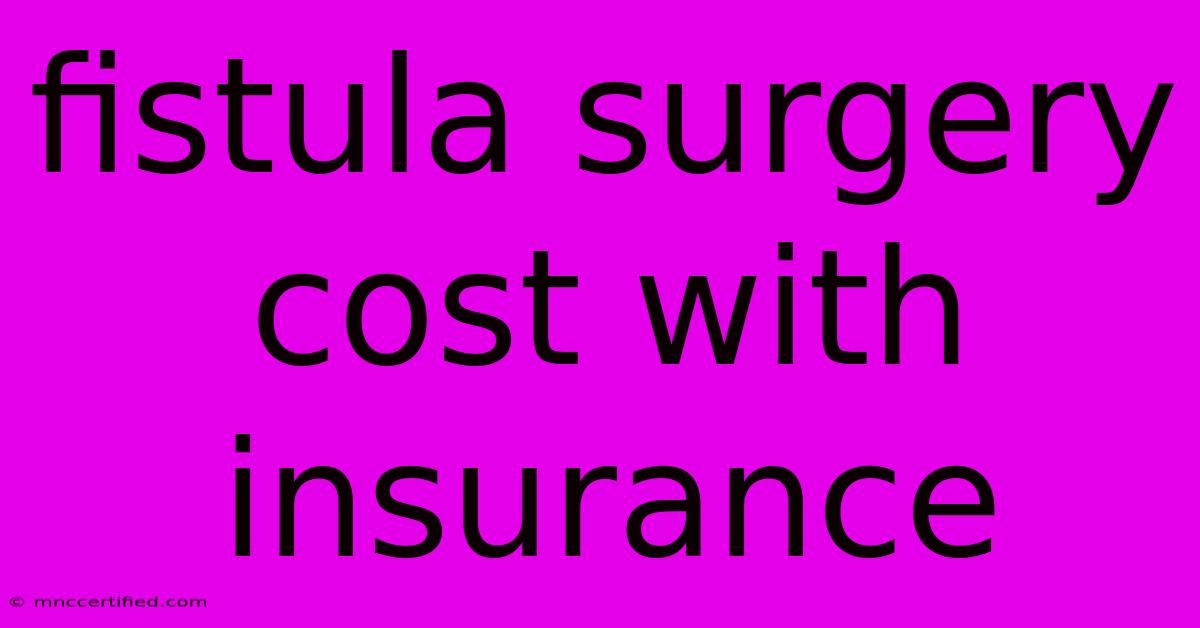Fistula Surgery Cost With Insurance

Table of Contents
Understanding Fistula Surgery Costs: Navigating Insurance Coverage
A fistula, an abnormal connection between two body parts, can be a challenging and painful condition. While surgery is often the solution, the cost of this procedure can be daunting. Fortunately, insurance can help offset some of the expenses, but navigating the complexities of coverage can be confusing. This article breaks down the key factors influencing fistula surgery costs and sheds light on how insurance can play a role.
Factors Influencing Fistula Surgery Costs
Several factors contribute to the overall cost of fistula surgery, impacting what you might ultimately pay out-of-pocket:
- Type of Fistula: Different types of fistulas, such as anal fistulas or arteriovenous fistulas, require different surgical approaches, impacting the complexity and duration of the procedure.
- Severity of the Fistula: The size, location, and presence of complications can affect the surgery's length and the need for additional treatments like antibiotics or wound care.
- Surgical Technique: The chosen surgical approach, such as a fistulotomy, seton placement, or flap repair, can influence the cost.
- Location: The geographical location of the hospital or surgical center can influence the cost of care due to variations in regional pricing.
- Anesthesia: General or regional anesthesia are often required for fistula surgery, adding to the overall cost.
- Post-operative Care: The length of hospitalization, wound care, and follow-up appointments can vary depending on the individual's recovery.
How Insurance Coverage Works
While insurance plans vary, most cover some portion of fistula surgery costs. Here's a breakdown of key elements:
- Deductible: Your insurance policy will likely have a deductible, which is the amount you need to pay before the insurance starts covering costs.
- Coinsurance: This is a percentage of the remaining costs you're responsible for after your deductible is met.
- Co-pay: A fixed amount you pay for each visit or service.
- Out-of-Pocket Maximum: This is the maximum amount you'll pay for healthcare costs in a given year, after which your insurance will cover the rest.
Navigating Insurance Coverage for Fistula Surgery
To maximize your insurance coverage for fistula surgery:
- Verify Coverage: Contact your insurance provider to understand your specific plan's coverage for fistula surgery, including deductibles, coinsurance, and co-pays.
- Pre-Authorization: Some procedures require pre-authorization, a process where your doctor obtains approval from your insurer before the surgery.
- Network Providers: Choose healthcare providers within your insurance network to ensure lower out-of-pocket expenses.
- Negotiate Costs: Consider discussing potential cost-saving options with your doctor, such as outpatient surgery or alternative treatments.
Seeking Help and Resources
If you're struggling with fistula surgery costs, explore these options:
- Patient Advocacy Groups: Organizations like the Crohn's & Colitis Foundation can provide valuable information on resources and financial assistance for those with fistulas.
- Hospital Financial Assistance: Many hospitals offer financial assistance programs for patients who are unable to afford their medical bills.
- Government Programs: Explore programs like Medicaid or Medicare, which can provide health insurance coverage for low-income individuals.
Conclusion
Navigating the costs of fistula surgery can be complex, but understanding your insurance coverage and available resources is crucial. By working closely with your doctor, insurer, and exploring potential financial assistance options, you can better manage the financial burden of this challenging condition. Remember, seeking help and information is the first step towards a successful recovery.

Thank you for visiting our website wich cover about Fistula Surgery Cost With Insurance. We hope the information provided has been useful to you. Feel free to contact us if you have any questions or need further assistance. See you next time and dont miss to bookmark.
Featured Posts
-
Life Insurance Companies Greensboro
Nov 13, 2024
-
Okongwu Wins It For Hawks Beat Celtics 117 116
Nov 13, 2024
-
Bears Make Coaching Change Waldron Out
Nov 13, 2024
-
Fox News Host Hegseth Joins Trump Administration
Nov 13, 2024
-
Does Insurance Cover Varicose Veins
Nov 13, 2024